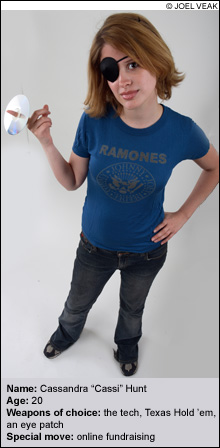 Cassi Hunt feels she’s being screwed. Last winter, the Recording Industry Association of America (RIAA) subpoenaed the Massachusetts Institute of Technology sophomore for allegedly sharing music files on i2hub, a high-speed campus-P2P network shuttered last November due to entertainment-industry pressure. When Hunt contacted the RIAA through a “settlement negotiation hotline,” she says a trade-group representative matter-of-factly informed the 20-year-old that she owed $3750 — non-negotiable and due in 15 days — for allegedly sharing 272 digital songs.
Cassi Hunt feels she’s being screwed. Last winter, the Recording Industry Association of America (RIAA) subpoenaed the Massachusetts Institute of Technology sophomore for allegedly sharing music files on i2hub, a high-speed campus-P2P network shuttered last November due to entertainment-industry pressure. When Hunt contacted the RIAA through a “settlement negotiation hotline,” she says a trade-group representative matter-of-factly informed the 20-year-old that she owed $3750 — non-negotiable and due in 15 days — for allegedly sharing 272 digital songs.
This response flabbergasted the St. Louis native, who is already in debt for student loans and is juggling three part-time jobs. “I’m like, ‘Wait a minute, wait a minute: I don’t have this money,’ ” she recalls on a recent Wednesday, in a second-floor lounge of MIT’s Stratton Student Center. “I said, ‘So what then? What does the RIAA expect college students to do?’ [The representative] said, ‘In the past, [the RIAA has] either encouraged students to either go to community college or drop out of school.’ ”
As Hunt wrote in MIT’s student newspaper, the Tech, “Are. You. Shitting. Me.”
Hunt is one of more than 18,200 people the RIAA has named in file-sharing lawsuits since September 2003. But when she went looking for firsthand accounts of recording-industry defendants on the Internet, she didn’t find many. “There’re plenty of people going, ‘Ah fuck the RIAA’ and less people actual laying out what has happened to them, what their options were,” she remembers. Consequently, Hunt not only decided to detail publicly the settlement-offer process in first-person essays for the Tech, but also set up screwpirates.com, a tongue-in-cheek fundraising Web site that illustrates how defenseless she feels: the site’s logo is a peg-legged pirate being, ahem, suggestively poked in the backside by a musical note.
Although she was photographed in an eye patch for screwpirates.com, Hunt is an unlikely poster girl for the grassroots RIAA opposition. She likes music well enough (“oldies, ’80s rock, stuff like that”), but she isn’t an mp3 collector and doesn’t even own an iPod. (She doesn’t know what 272 songs the RIAA says she put online; the trade group doesn’t reveal that list without a formal request, which Hunt has yet to make.) In truth, she used i2hub more like a stripped-down TiVo than like an unlocked record store: she’d dig up prime-time shows she’d missed, like Lost and Smallville (“my guilty pleasure”); her MIT dorm room doesn’t get Comedy Central, so the only way the physics major could see South Park and The Daily Show was by unearthing episodes on i2hub.
The RIAA wouldn’t discuss Hunt’s situation with the Phoenix, but it reissued a previously released response. “It’s not our position to tell individuals how to pay for a settlement. It is our role to enforce our rights under the laws.”
Hunt doesn’t admit to sharing the 272 files in question — she hasn’t joined the 4470 other defendants who’ve signed a settlement agreement with the RIAA. “Really, what I’m offended with is the way RIAA handles the suits,” she says, clarifying that she’s been presumed guilty before being proven innocent. Ultimately, the RIAA representative did offer her a six-month repayment plan, and after seeking pro bono legal advice, Hunt realizes that it’d cost more than $3750 to bring the case to court, even if she won. “The people that they’re targeting are the people who don’t have the access or the experience to combat this.”